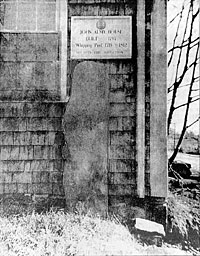 TIVERTON, 1790’s – early 1800’s
TIVERTON, 1790’s – early 1800’s
WOMEN AT TIVERTON FOUR CORNERS TAKE A STAND
This happening at the Four Corners took place after the Revolution and before the War of 1812. People milled about the roadway between the “red store” and the “white store” where a terrified woman was bound to an upright stone post. Young Governor Isaac Wilbour was conspicuous in the crowd wearing a ruffled front stock above his frock coat and abundant hair tied in a queue. This handsome authority was attended by two uniformed officers: an officious sheriff plus a constable. The women surged around in violent protest against the proposed indignity to one of “the sex”!
A long stone post stood upright in a lot across the Great West Road at Tiverton Four Corners. It was the whipping post.
Isaac Wilbour was the only man from S’cunnet who ever sat in the Governor’s chair, or was sent to Congress, or appointed to the State Supreme Court.
One day he was jogging homeward on horseback. He was wearing his broad brimmed hat and the straight coat of a Quaker, and was no doubt looking forward to a few days on S’cunnet’s flat black land that he loved. As he approached the Four Corners, what a sight did he behold!
A woman, her back bared, was tied to the whipping post. The Governor’s Quaker soul must have quaked at the sight and at the sound of her wailing. All around her thronged the ladies of the Four Corners, wringing their hands, weeping and wailing, too, and altogether raising as great a clamor as was ever heard in Newport County.
Off to one side stood the sheriff who had been sent by the court to do the flogging. And idling around were men who seemed more interested in the shapeliness of the victim’s back than in the outrage about to be visited upon it.
As the Governor came nearer, the clamor of the ladies grew in volume and ascended in pitch. They recognized him. They flooded out into the road and barred his way. They surrounded his horse and their cacophony must have nigh deafened him. The senses of a lesser man would have been instantly overthrown.
But Isaac sat calmly in the saddle listening to them. They angrily demanded to know what kind of business was this. Against errant members of their sex, the Four Corners women of that day were not backward with tongue-lashings, as the Governor well knew; but to have a lady’s back exposed and lashed in public for just a little carrying on — that surely was going too far.
“Let us see, let us see,” said Isaac, when he could make his voice heard at all. He reached into a pocket of his coat and pulled out a booklet containing the laws of Rhode Island. Today you can hardly pack all the General Laws into a freight car, but back then you could carry them in a pocket quite handily.
He pulled his broad-brimmed hat down over his eyes and turned the pages. He found the section he wanted and read it to them: “The condemned shall be tied to an upright post and flogged according to the sentence of the court.” As he slowly put the book back in his pocket and righted his hat, he told them quietly that was the law, that here was a woman sentenced by the court to be flogged for a misdemeanor, and that as Governor he had taken an oath of affirmation to see that the laws were executed.
They clamored again. They upbraided the Governor. If they had been the run of women of today, they would have cried, “If that’s the law, to hell with it.” But the ladies of the Four Corners have never used such language.
“But, ladies,” Isaac stretched out his hand to quiet them again. He leaned from the saddle and murmured so that only those nearest him could hear. “But, ladies, if it happened that there was no upright post, how could the law be carried out?”
You have to admire the women of Tiverton Four Corners – they always get the point. They ganged up on the sheriff and gave that unfortunate man an historic pushing around. Never did a servant of the law contend against worse odds.
Like angry bees, they swarmed upon the victim who had misdemeaned. They unbound her from the post and drew the habiliments of modesty over her admirable back and shoulders. And then – ah, what cannot womanhood do when its righteous fury is aroused! – they pushed and they pulled, they shoved and they dragged, they puffed and they huffed, until that post was no longer upright. It slanted over, and presently, there it lay, prone upon the ground, never to rise again: the very form and symbol of Injustice brought low.
The Governor, at first watching with a wry smile, discreetly withdrew before events assumed their final posture. He rode slowly up Windmill Hill, and then cantered down onto the flat black land. Devout Quaker that he was, how he would have rejoiced had he known how great was the debt the tender sex would owe him and the ladies of Four Corners unto the furthest generation! For the crash of that whipping post had signalized the inglorious end of all its counterparts and never again was a woman to be publicly flogged in Rhode Island.
From “Those Four Corners Ladies” by David Patten in A Patchwork History of Tiverton, Rhode Island – 1976 Bicentennial Edition, published by the Tiverton Historical Society
